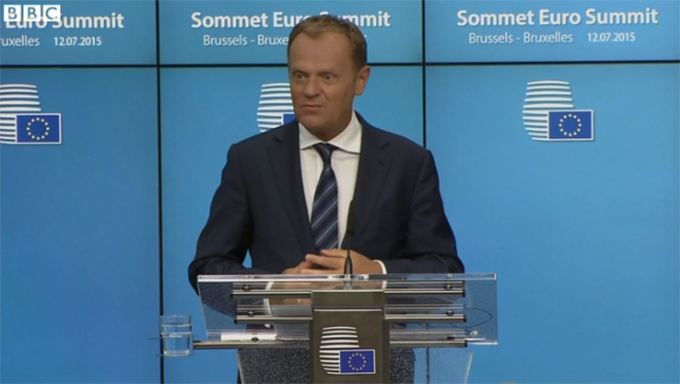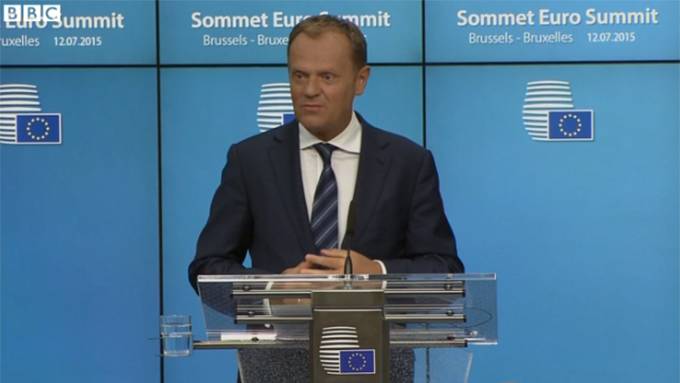Greece debt crisis: Eurozone summit strikes deal
Source: bbc.com

Eurozone leaders have agreed to offer Greece a third bailout, after marathon talks in Brussels.
Amid one of the worst crises in the EU's history, the head of the European Commission said the risk of Greece leaving the eurozone had been averted.
Greek Prime Minister Alexis Tsipras said that after a "tough battle", Greece had secured debt restructuring and a "growth package".
The bailout is conditional on Greece passing agreed reforms by Wednesday.
These include measures to streamline pensions, raise tax revenue and liberalise the labour market.
An EU statement spoke of up to €86bn (£61bn) of financing for Greece over three years.
Though it included an offer to reschedule Greek debt repayments "if necessary", there was no provision for the reduction in Greek debt - or so-called "haircut" - that the Greek government had sought.
Parliaments in several eurozone states also have to approve any new bailout.
"There will not be a 'Grexit'," said European Commission chief Jean-Claude Juncker, referring to the fear that if there had been no deal, Greece could have crashed out of the euro.
Mr Tsipras also said he had the "belief and the hope that... the possibility of 'Grexit' is in the past".
"The deal is difficult but we averted the pursuit to move state assets abroad," he said. "We averted the plan for a financial strangulation and for the collapse of the banking system."
The Greek PM returned to Athens after the talks and went straight into a meeting with Finance Minister Euclid Tsakalotos and other party officials.
Mr Tsipras must get several unpopular measures through the Greek parliament in the next two days, including sales tax increases and pension reforms, to continue the third bailout process.
Analysis: Gavin Hewitt, BBC News, Athens
Athens has been offered a third bailout. Bankruptcy - the spectre of a failed state - has been avoided, and Greece will stay inside the euro. But the deal has left many Greeks humiliated. It is not just the ranks of the left that are using the word "surrender".
Greek Prime Minister Alexis Tsipras will have to rush key measures on pension reforms, tax increases and a debt repayment fund through parliament. It will be a bruising process. Only then will bridging loans be released that will enable Greece to meet a payment to the European Central Bank next Monday.
As it is, the deal will almost certainly lead to snap elections. Mr Tsipras will reshuffle his cabinet and discard those cabinet ministers who opposed his latest proposal.
Jeroen Dijsselbloem, the head of the eurozone group of finance ministers, said the agreement included a €50bn Greece-based fund that will privatise or manage Greek assets. Out of that €50bn, €25bn would be used to recapitalise Greek banks, he said.
Greek banks have been closed for two weeks, with withdrawals at cash machines limited to €60 per day. The economy has been put under increasing strain, with some businesses closing and others struggling to pay suppliers.
Eurozone finance ministers meeting in Brussels have discussed providing "bridge financing" that would cover Greece's short-term needs, but have made no final decisions.
"The road will be long, and judging by the negotiations tonight, difficult," German Chancellor Angela Merkel said on Monday morning.
French President Francois Hollande said the agreement had allowed Europe to "preserve integrity and solidarity".
"We also had to show that Europe is capable of solving a crisis that has menaced
the eurozone for several years," he said.
Greek debt crisis timeline
- 26 June: Greece halts talks with creditors and calls referendum on bailout terms
- 28 June: European Central Bank (ECB) limits emergency funding to Greece; Greece imposes capital controls, forcing banks to stay shut
- 30 June: Eurozone bailout expires, Greece misses €1.6bn payment to IMF
- 5 July: Greeks overwhelmingly vote "No" in referendum, rejecting creditors' conditions
- 9 July: Greek Prime Minister Alexis Tsipras presents new proposals to creditors, including measures rejected in referendum
- 13 July: Eurozone leaders agree to offer Greece third bailout
And looking forward...
- 15 July: Greek parliament to pass reforms demanded by creditors
- 16-17 July: Possible votes in eurozone member state parliaments on bailout
- 20 July: Greece due to make €3.5bn payment to ECB
Mr Juncker said: "In this compromise, there are no winners and no losers.
"I don't think the Greek people have been humiliated, nor that the other Europeans have lost face. It is a typical European arrangement."
However, many Greeks and others who thought that unduly harsh terms were being imposed on Greece have expressed their widespread anger online using the hashtag #ThisIsACoup.
Mr Tsipras came to power after his left-wing Syriza party won elections in January on a promise to end austerity. Greece has already received two bailouts totalling €240bn since 2010.
Source: bbc.com






















